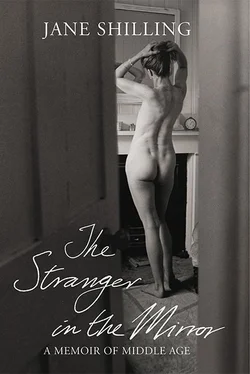‘All right’ was an expression much repeated by my consoling friends in the following days. ‘You’ll be all right,’ they said. ‘You’ll be picked up by the Brute , the Beast , one of the Sundays. X is bound to look after you, or Y. What about Z, have you sent him an email?’ I must not panic, they said. I needed to get my name out there. I should tap up everyone I had ever worked with. Above all, I must keep my nerve. Everything would be all right.
I wanted very much to believe this, and managed to some of the time. I had been sacked several times in my twenties, mostly from dull clerical jobs that I didn’t much mind losing. I’d only minded the last of those sackings, from a job I loved, as assistant to a man I had thought of as a friend. ‘In time,’ he said, giving me the bad news, ‘you will come to see this as a good thing.’
‘Sanctimonious old idiot,’ said I, furiously ignoring the half-apology hidden in this unappetising bit of cold consolation and scuttling the friendship with the superb recklessness of the very young, who think that friendship is an infinitely renewable resource. He was right, though. After the end of that job I shifted from publishing to journalism, from dealing with other people’s writing to writing myself; and felt, for the first time in my working life, as though I knew what I was doing.
Early in my writing career I was sent to interview a Frenchwoman, a designer who had had the idea – commonplace now, but original twenty years ago – of using the hoardings outside buildings undergoing renovation as giant canvases for artwork. In 1991, when I visited her studio on the outskirts of Paris, she had covered the hoardings outside the church of the Madeleine with a trompe l’oeil image of the Madeleine itself. Earlier she had wrapped the Arc de Triomphe in a French flag. When the restoration projects were finished, so was the life of her artwork: it was unwrapped, dismantled, photographs the only proof that it had ever existed.
I was newly pregnant when I interviewed her, and newly parted from the child’s father and some of my disturbance of mind must have communicated itself to her, for when the interview seemed to have ended and I was putting away my tape recorder she said, in the very clear, rather formal French in which she had given the interview – slowly, so that I would understand properly what she meant – that she had found that life changed, completely, every seven years or so and that although change was painful – pénible – and hard the thing was to embrace it, not to resist but to go with it, see where it took you. She wished me good luck with what I undertook in the future.
It was so kindly said, and with such infectious serenity that it silenced the voice that had been shrilling inside my head since I’d discovered that I was pregnant: ‘What am I going to do? Whatever am I going to do?’ And although the borrowed stillness and composure lasted only as long as the trip to Paris and dissolved again into panic and disorder as soon as I got home, the memory of them left a permanent impression.
I thought now that I should try to live this crisis more gracefully than I had that one. I had spoiled my pregnancy – my only chance at pregnancy – with panic and hysteria, made myself very unhappy, transferred goodness knew what stress hormones to my unborn child – and for what?
In the end everything had turned out well enough. I had not gone entirely mad, or died of loneliness, or been unable to cope with the baby. A marvellous stroke of good fortune – the arrival of Linda – and a lot of accumulated acts of everyday kindness from my neighbours and friends had kept us safe at the beginning, and as the early danger passed our life had grown into something of which I felt proud. I was a writer, and a good-enough mother. That was not nothing.
Except that now I wasn’t a writer, and if I couldn’t keep a roof over our heads, I wouldn’t be a good-enough mother, either. ‘Not very secure, is it, a contract?’ more solidly employed friends would sometimes say. ‘Aren’t you scared?’ Terrified, I’d say, and I would trot out a little anecdote about the goldfish in Sellar and Yeatman’s comic gardening manual, Garden Rubbish , who lives in a lavatory cistern in a sordid bit at the bottom of the garden known as the Unpleasaunce, swimming about in a state of permanent terror that someone will come along and pull the chain. I am that goldfish, I would say, and whoever I was saying it to would laugh merrily and so would I.
I was guilty, I saw now, of what Joan Didion calls Magical Thinking: the delusion that one can bargain with fate, or deflect it by sheer force of will. In my rational mind I knew my job couldn’t last for ever. Columnists’ lives are generally short, and at twelve years I’d already outlasted the average life expectancy by many years. But in my magical mind I believed that fate would take into account my personal difficulties – the fact that I was a hard-working single mother, doing her best to keep a home together and raise a happy, well-educated child – and pick its moment before administering any kind of serious blow.
I knew one couldn’t live a life without setbacks – that was how one grew as a person, after all – but I felt that it would be only fair if mine came singly. My plan, insofar as I had a plan, was to hope that my luck held until Alexander had finished his education, then sell up in London and retreat to an even smaller house in the country. I had not allowed myself to think what might happen if fate chose not to play by my rules.
On that first dreadful white night after losing my job, and on many sleepless nights afterwards, I tried to hold myself together by thinking of my foundling grandfather – the resourcefulness with which he had steadily resisted his own blows of fate (so much more numerous and dangerous and discouraging than this of mine. A hard, bitter fight all his life to survive, yet he’d never made it look hard.)
As a child and a teenager I remembered him always engaged, always charging at life, always amused, interested, always trying to shape the random muddle of happenstance into a story, to use words to impose a meaning and a form on chaotic accident. His own mother had had to give up the struggle to take care of him; I thought he would think less of me if I were not to fight now for my own small household. All the same, I wasn’t sanguine about where fighting would get me.
As my notice came to an end I received a letter from the managing editor’s office, confirming that my contract had been terminated and thanking me for my ‘contribution over the past few years’. I wasn’t an employee, so there was no question of redundancy pay. The following month, for the first time since leaving university, there would be no income. I visited my financial adviser, to see if he had any counsel to offer. He was a kind man, but it was a short, bleak meeting. ‘Your best bet,’ he said, ‘is to educate your son as well as you can, and hope to God he looks after you.’ Outside in the high summer sunshine I turned my face to the hot brick wall of his office and, for almost the first time since it had happened, I wept.
It was strange to walk through the park with the sun on my back. For whole minutes at a time I would feel perfectly happy; absorbed in the animal contentment of the sunshine, the smell of the hot grass, the hum of London in midsummer. Then with a shock I would remember that my life was in freefall, nothing belonged to me: even the half-pound of sausages in my basket had been bought with borrowed money.
The excursions I made into London social life were odder still. Even after my son was old enough to be left alone in the evenings, I had never much liked going out. I was afraid of parties and would rather stay at home, cook supper, hear about the school day, oversee the homework (it was, of course, this fatal lack of networking that had done for my career).
Читать дальше












